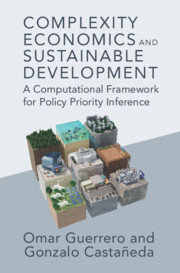 Complexity Economics and Sustainable Development
Complexity Economics and Sustainable Development Book contents
- Frontmatter
- Dedication
- Contents
- Figures
- Tables
- Foreword
- Acknowledgments
- Abbreviations
- Part I A Complexity Approach to Sustainable Development
- 1 Introduction
- 2 Policy Prioritisation, Complexity, and Agent Computing
- 3 Relevant Data and Empirical Challenges
- 4 A Computational Model
- 5 Calibration and Validation
- Part II A Global View of Sustainable Development
- Part III A Focalised View of Sustainable Development
- Bibliography
- Index
4 - A Computational Model
from Part I - A Complexity Approach to Sustainable Development
Published online by Cambridge University Press: 04 January 2024
- Frontmatter
- Dedication
- Contents
- Figures
- Tables
- Foreword
- Acknowledgments
- Abbreviations
- Part I A Complexity Approach to Sustainable Development
- 1 Introduction
- 2 Policy Prioritisation, Complexity, and Agent Computing
- 3 Relevant Data and Empirical Challenges
- 4 A Computational Model
- 5 Calibration and Validation
- Part II A Global View of Sustainable Development
- Part III A Focalised View of Sustainable Development
- Bibliography
- Index
Summary
This chapter introduces a model in which a government allocates financial resources across several policy issues (development dimensions), and a set of public servants (or agencies) that, through government programmes, transform public spending into policy outcomes. We start by describing the macro-level dynamics and the relevant equations involved. Then, we introduce a political economy game between the government and its officials (or public servants). First, we describe the public servants’ decision making in an environment of uncertainty through reinforcement learning. Second, we elaborate on the problem of the government (or central authority) and how we can specify its heuristic strategy. Finally, we provide an overview of the entire structure of the model.
Keywords
- Type
- Chapter
- Information
- Complexity Economics and Sustainable DevelopmentA Computational Framework for Policy Priority Inference, pp. 104 - 128Publisher: Cambridge University PressPrint publication year: 2024
